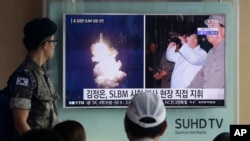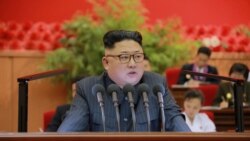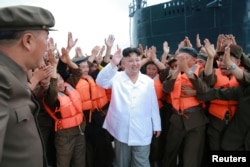North Korea conducted two missiles tests in the past seven days, even though the country is under the United Nations harshest economic sanctions and South Korea has decided to deploy the United State's Terminal High Altitude Area Defense (THAAD) Missile System as a deterrent.
With the North's accelerated weapons testing schedule, some are wondering if the sanctions and other measures are succeeding at all in curbing leader Kim Jong Un's provocative behavior.
Rodger Baker, VP of Strategic Analysis for Stratfor.com, says it's "fairly clear" the sanctions in place are not achieving their goals.
"They are not preventing the North from pursuing a nuclear program or a missile program,” Baker said. “In fact, they may be accelerating that program as the North sees a need to create another layer of protection for itself as it sees itself increasingly isolated by the international community."
Harry Kazianis, director of Defense Studies at the Center for the National Interest, added that the role of sanctions really depends on what the overall goals of such a program would be.
"Is your goal to try and squeeze the regime … to try and constrain it economically? I think the record on that is mixed," he said.
Kazianis says it is important to focus on Pyongyang's relative economic isolation.
"The North Korean regime isn't exactly tied to the world economically," he said. "This isn't like the United States or China or other countries where they are heavily reliant on trade with multiple trade partners. [North Korea's] not integrated to the global financial system like almost every other country on the planet. They're called the Hermit Kingdom for a reason."
North Korean expectations
Given the sanctions that have been placed on North Korea and its accelerated testing schedule, is it likely that Kim Jong Un will cease his nuclear and missile programs?
"No," said Kazianis, "I think if we're trying to figure out if there's any way that Kim is going to let go of these programs … I think in the long term, the answer is absolutely not."
Because, as Baker puts it, the way North Korea views the sanctions and programs isn't the same as a few decades ago. North Korea is "looking at these programs as something they need to complete for national survival and national strengthening. And that's why there's really nothing that would convince them to trade them away."
Ostracism vs engagement
If North Korea no longer views its missile and nuclear programs as negotiable, what options remain for dealing with Kim Jong Un?
"If we accept the premise that North Korea is going to use missiles to hypothetically deliver nuclear weapons in some sort of horrific scenario," Kazianis said, "then I think our best option is for the United States to work with our South Korean and Japanese friends to really ring North Korea around with lots of missile defense platforms."
He notes that this is already starting, with South Korea deploying the United States' THAAD missile system and Japan updating its Patriot missiles.
"One of the possibilities to at least manage the pace and the development of the weapons is perhaps some form of engagement," Baker said. He notes that the term "engagement" sometimes takes on a negative connotation in the U.S., as it's "seen as giving privileges or rewarding bad behavior or something of that sort, but at least it would provide a regularized form of contact."
With multiple missile launches this year and satellite imagery recently confirming activity at North Korea's Punggye-ri nuclear testing facility, the world may see additional tests in the waning weeks of 2016.
However, Baker notes, "If North Korea starts to be perceived more as a risk to the Chinese, then they may pursue alternate political relations in Pyongyang. The Chinese always hold [the potential] to intervene physically in North Korean politics. They refrain from doing that because that would set a precedent that completely changes the way in which they've tried to shape their international foreign policy for the past 30 years."
Kazianis agrees that Kim may order more missile tests and would not be "shocked" if there was another nuclear test before 2017 rolls around.
"Now," he said, "we have to keep in mind, from what at least I've seen as the months and years have sort of gone on, these tests are sort of becoming the status quo — people are getting used to them [and] they're not drawing the headlines they used to, so there is a possibility that Kim may try to ratchet up tensions even more."









